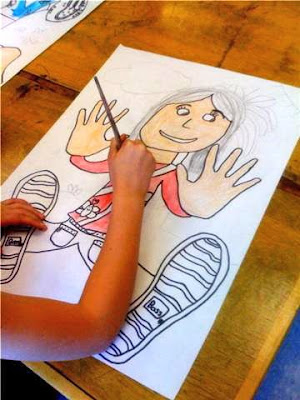Being prepared to deal with an emergency is important for anyone and this is what Get Ready Day is all about. It is staged each year as a way of encouraging individuals, families, and communities to consider what is required in the event of natural disasters, pandemic illnesses, infectious diseases, and other crisis events. The day was first established in the mid 2000’s by the Public Health Association and the Get Ready website has a wealth of information to help those that are interested.
Planning an event is a way to bring attention to the day and the serious nature of being prepared for any type of crisis. This can be done by individuals to discuss suitable emergency plans with friends and families. Schools, colleges, and community centers can also host talks to distribute literature and give advice on the best ways to prepare for potential dangers and disasters.
Word of the Day
| |||
| Definition: | (noun) Excessive desire, especially for wealth. | ||
| Synonyms: | covetousness, avarice | ||
| Usage: | Their very cupidity was to prove the means of their undoing, in the matter of the ransom at least. | ||
Idiom of the Day
have enough on (one's) plate— To be sufficiently busy or preoccupied with work, problems, or difficulties as to be unable or unwilling to cope with anything more |
History
James Dewar (1842)
Dewar was a British chemist and physicist best known for his work on the properties of matter at very low temperatures and the liquefaction of gases. In the course of his work, he liquefied and solidified hydrogen and invented the Dewar flask. Used for storing liquefied gases, his Dewar flask—a double-walled flask with an insulating vacuum between the inner and outer walls—became essential in low-temperature scientific work.
Oktoberfest
The first Oktoberfest was held on October 12, 1810, in honor of the marriage of Crown Prince Ludwig of Bavaria to Princess Therese von Saxony-Hildburghausen. Since that time it has become, above all else, a celebration of German beer. The Lord Mayor of Munich, Germany, opens the first barrel, and the 16-day festival begins. Both citizens and tourists flock to this event, which is marked by folk costume parades in which brewery horses draw floats and decorated beer wagons through the streets. Oktoberfest celebrations are also held in cities throughout the United States.
Scientists Discover Amazing Tool-Wielding Ability of Nearly Extinct Hawaiian Crows
Hawaiian crows, a species extinct in the wild, have demonstrated a remarkable skill that's exceptionally rare in the animal kingdom: the ability to use tools.READ MORE:
1881 - Chester A. Arthur became the 21st president of the U.S. President James A. Garfield had died the day before.
1921 - KDKA in Pittsburgh, PA, started a daily radio newscast. It was one of the first in the U.S.
1946 - The first Cannes Film Festival premiered. The original premier was delayed in 1939 due to World War II.
1953 - The TV show "Letter to Loretta" premiered. The name was changed to "The Loretta Young Show" on February 14, 1954.
1955 - "You'll Never Be Rich" premiered on CBS-TV. The name was changed less than two months later to "The Phil Silvers Show."
1962 - James Meredith, a black student, was blocked from enrolling at the University of Mississippi by Governor Ross R. Barnett. Meredith was later admitted.
1966 - George Harrison went to India for his first visit to Maharishi Mahesh Yogi.
1967 - The ocean liner Queen Elizabeth 2 (QE2) was launched. It went out of service on November 27, 2008.
1976 - "The Captain & Tennille" show premiered on ABC-TV.
1998 - The Rock and Roll Hall of Fame and Museum paid tribute to Robert Johnson with eight days of activities. Johnson only recorded 29 songs before dying in August of 1938.
DAILY SQU-EEK
READER'S INFO

HARDLY STRICTLY BLUEGRASS FESTIVAL
Sep 30 - Oct 2, 2016
San Francisco, California
Hardly Strictly Bluegrass is the brainchild of Warren Hellman , the co-founder of multi-billion dollar private equity firms Hellman & Friedman and Matrix Partners. Being a high-roller like that apparently makes almost anything possible, because when Hellman decided back in 2001 that he’d like to foot the bill for a free bluegrass festival in Golden Gate Park, lo and behold, he made it happen. As Hellman told Forbes Magazinein 2006, “How could you have more fun than that? What the hell is money for if it isn’t for something like that?”Hardly Strictly Bluegrass Festival

DECIBEL FESTIVAL
Sep 23 - 27, 2015
Seattle, Washington,
Decibel Festival was founded in 2003 by Sean Horton to expose people to cutting edge electronic music, interactive multimedia and visual art—and to educate them, too. A number of forces led him toward its inception: growing up in Detroit listening to techno artists, moving to Seattle and working in the music business, and a desire to unite what he calls a “seemingly elusive community of electronic music fans who, like me, had become disenchanted with the ‘post-rave’ cultural landscape.”Decibel Festival
thanks, shelley

Pictures of the day

Woman Holding a Balance is an oil painting by Dutch Baroque artist Johannes Vermeer. Opinions on the theme and symbolism of the painting differ, with the woman alternatively viewed as a symbol of holiness or earthliness. The woman's actions have likewise been interpreted in several ways; at one time the painting, completed 1662–63, was known as Woman Weighing Gold, but closer evaluation has determined that the balance in her hand is empty. The painting is held at the National Gallery of Art in Washington, D.C.
Just a Cheetah Cub and a Puppy

10 week-old Emmett and 7 week-old Cullen are going to be friends for a long time
knit
knit, 3 - 8 yrs
knit
knit

crochet
crochet
crochet
crochet

RECIPE
Chicken with potato cakes
taste
- Ingredients
- Method
- Step 1Place the tapenade in a bowl. Add the chicken and turn to coat.
- Step 2Place the potato in a large bowl. Season with salt and pepper. Add enough oil to a frying pan to come 5mm up the side. Heat over medium heat. Add four 1/3-cup portions of potato and flatten slightly. Cook for 2-3 minutes each side or until crisp and golden. Transfer to a plate lined with paper towel. Repeat, in 2 more batches, with the remaining mixture.
- Step 3Meanwhile, preheat grill on high. Cook chicken for 3-4 minutes each side or until cooked. Thickly slice.
- Step 4Serve with potato cakes and salad.
CROCKPOT RECIPE
SWEETS
ADULT COLORING
The art deco facade, on a Chicago building
CRAFTS
LIGHT BULB VASE
CHILDREN'S CORNER ... art
PUZZLE
|

QUOTE


CLEVER
thanks, patty
WHAT IS A TEMPERATURE BLANKET (or scarf)
thanks, shelley
thanks, sally
Laughter is the Best Medicine
The Health Benefits of Humor and Laughter
helpguide
Humor is infectious. The sound of roaring laughter is far more contagious than any cough, sniffle, or sneeze. When laughter is shared, it binds people together and increases happiness and intimacy. Laughter also triggers healthy physical changes in the body. Humor and laughter strengthen your immune system, boost your energy, diminish pain, and protect you from the damaging effects of stress. Best of all, this priceless medicine is fun, free, and easy to use.
Laughter is strong medicine for mind and body
“Your sense of humor is one of the most powerful tools you have to make certain that your daily mood and emotional state support good health.”
~ Paul E. McGhee, Ph.D.
Laughter is a powerful antidote to stress, pain, and conflict. Nothing works faster or more dependably to bring your mind and body back into balance than a good laugh. Humor lightens your burdens, inspires hopes, connects you to others, and keeps you grounded, focused, and alert.
With so much power to heal and renew, the ability to laugh easily and frequently is a tremendous resource for surmounting problems, enhancing your relationships, and supporting both physical and emotional health.
Laughter is good for your health
- Laughter relaxes the whole body. A good, hearty laugh relieves physical tension and stress, leaving your muscles relaxed for up to 45 minutes after.
- Laughter boosts the immune system. Laughter decreases stress hormones and increases immune cells and infection-fighting antibodies, thus improving your resistance to disease.
- Laughter triggers the release of endorphins, the body’s natural feel-good chemicals. Endorphins promote an overall sense of well-being and can even temporarily relieve pain.
- Laughter protects the heart. Laughter improves the function of blood vessels and increases blood flow, which can help protect you against a heart attack and other cardiovascular problems.
The benefits of laughter
| Physical Health Benefits |
|
| Mental Health Benefits |
|
| Social Benefits |
|
Laughter and humor help you stay emotionally healthy
Laughter makes you feel good. And the good feeling that you get when you laugh remains with you even after the laughter subsides. Humor helps you keep a positive, optimistic outlook through difficult situations, disappointments, and loss.
More than just a respite from sadness and pain, laughter gives you the courage and strength to find new sources of meaning and hope. Even in the most difficult of times, a laugh–or even simply a smile–can go a long way toward making you feel better. And laughter really is contagious—just hearing laughter primes your brain and readies you to smile and join in the fun.
The link between laughter and mental health
- Laughter dissolves distressing emotions. You can’t feel anxious, angry, or sad when you’re laughing.
- Laughter helps you relax and recharge. It reduces stress and increases energy, enabling you to stay focused and accomplish more.
- Humor shifts perspective, allowing you to see situations in a more realistic, less threatening light. A humorous perspective creates psychological distance, which can help you avoid feeling overwhelmed.
The social benefits of humor and laughter
Humor and playful communication strengthen our relationships by triggering positive feelings and fostering emotional connection. When we laugh with one another, a positive bond is created. This bond acts as a strong buffer against stress, disagreements, and disappointment.
Laughing with others is more powerful than laughing alone
Creating opportunities to laugh
- Watch a funny movie or TV show.
- Go to a comedy club.
- Read the funny pages.
- Seek out funny people.
- Share a good joke or a funny story.
- Check out your bookstore’s humor section.
- Host game night with friends.
- Play with a pet.
- Go to a “laughter yoga” class.
- Goof around with children.
- Do something silly.
- Make time for fun activities (e.g. bowling, miniature golfing, karaoke).
Shared laughter is one of the most effective tools for keeping relationships fresh and exciting. All emotional sharing builds strong and lasting relationship bonds, but sharing laughter and play also adds joy, vitality, and resilience. And humor is a powerful and effective way to heal resentments, disagreements, and hurts. Laughter unites people during difficult times.
Incorporating more humor and play into your daily interactions can improve the quality of your love relationships—as well as your connections with co-workers, family members, and friends. Using humor and laughter in relationships allows you to:
- Be more spontaneous. Humor gets you out of your head and away from your troubles.
- Let go of defensiveness. Laughter helps you forget judgments, criticisms, and doubts.
- Release inhibitions. Your fear of holding back and holding on are set aside.
- Express your true feelings. Deeply felt emotions are allowed to rise to the surface.
Bringing more humor and laughter into your life
Want more laughter in your life? Get a pet…
Most of us have experienced the joy of playing with a furry friend, and pets are a rewarding way to bring more laughter and joy into your life. But did you know that having a pet is good for your mental and physical health? Studies show that pets can protect you depression, stress, and even heart disease.
Laughter is your birthright, a natural part of life that is innate and inborn. Infants begin smiling during the first weeks of life and laugh out loud within months of being born. Even if you did not grow up in a household where laughter was a common sound, you can learn to laugh at any stage of life.
Begin by setting aside special times to seek out humor and laughter, as you might with working out, and build from there. Eventually, you’ll want to incorporate humor and laughter into the fabric of your life, finding it naturally in everything you do.
Here are some ways to start:
- Smile. Smiling is the beginning of laughter. Like laughter, it’s contagious. Pioneers in “laugh therapy,” find it’s possible to laugh without even experiencing a funny event. The same holds for smiling. When you look at someone or see something even mildly pleasing, practice smiling.
- Count your blessings. Literally make a list. The simple act of considering the good things in your life will distance you from negative thoughts that are a barrier to humor and laughter. When you’re in a state of sadness, you have further to travel to get to humor and laughter.
- When you hear laughter, move toward it. Sometimes humor and laughter are private, a shared joke among a small group, but usually not. More often, people are very happy to share something funny because it gives them an opportunity to laugh again and feed off the humor you find in it. When you hear laughter, seek it out and ask, “What’s funny?”
- Spend time with fun, playful people. These are people who laugh easily–both at themselves and at life’s absurdities–and who routinely find the humor in everyday events. Their playful point of view and laughter are contagious.
- Bring humor into conversations. Ask people, “What’s the funniest thing that happened to you today? This week? In your life?”
Developing your sense of humor: Take yourself less seriously
One essential characteristic that helps us laugh is not taking ourselves too seriously. We’ve all known the classic tight-jawed sourpuss who takes everything with deathly seriousness and never laughs at anything. No fun there!
Some events are clearly sad and not occasions for laughter. But most events in life don’t carry an overwhelming sense of either sadness or delight. They fall into the gray zone of ordinary life–giving you the choice to laugh or not.
Ways to help yourself see the lighter side of life:
Checklist for lightening up
When you find yourself taken over by what seems to be a horrible problem, ask these questions:
- Is it really worth getting upset over?
- Is it worth upsetting others?
- Is it that important?
- Is it that bad?
- Is the situation irreparable?
- Is it really your problem?
- Laugh at yourself. Share your embarrassing moments. The best way to take yourself less seriously is to talk about times when you took yourself too seriously.
- Attempt to laugh at situations rather than bemoan them. Look for the humor in a bad situation, and uncover the irony and absurdity of life. This will help improve your mood and the mood of those around you.
- Surround yourself with reminders to lighten up. Keep a toy on your desk or in your car. Put up a funny poster in your office. Choose a computer screensaver that makes you laugh. Frame photos of you and your family or friends having fun.
- Keep things in perspective. Many things in life are beyond your control—particularly the behavior of other people. While you might think taking the weight of the world on your shoulders is admirable, in the long run it’s unrealistic, unproductive, unhealthy, and even egotistical.
- Deal with your stress. Stress is a major impediment to humor and laughter.
- Pay attention to children and emulate them. They are the experts on playing, taking life lightly, and laughing.
Using humor and play to overcome challenges and enhance your life
The ability to laugh, play, and have fun with others not only makes life more enjoyable but also helps you solve problems, connect with others, and be more creative. People who incorporate humor and play into their daily lives find that it renews them and all of their relationships.
Life brings challenges that can either get the best of you or become playthings for your imagination. When you “become the problem” and take yourself too seriously, it can be hard to think outside the box and find new solutions. But when you play with the problem, you can often transform it into an opportunity for creative learning.
Playing with problems seems to come naturally to children. When they are confused or afraid, they make their problems into a game, giving them a sense of control and an opportunity to experiment with new solutions. Interacting with others in playful ways helps you retain this creative ability.
Here are two examples of people who took everyday problems and turned them around through laughter and play:
Roy, a semi-retired businessman, was excited to finally have time to devote to golf, his favorite sport. But the more he played, the less he enjoyed himself. Although his game had improved dramatically, he got angry with himself over every mistake. Roy wisely realized that his golfing buddies affected his attitude, so he stopped playing with people who took the game too seriously. When he played with friends who focused more on having fun than on their scores, he was less critical of himself. Now golfing was as enjoyable as Roy hoped it would be. He scored better without working harder. And the brighter outlook he was getting from his companions and the game spread to other parts of his life, including his work.
Jane worked at home designing greeting cards, a job she used to love but now felt had become routine. Two little girls who loved to draw and paint lived next door. Eventually, Jane invited the girls in to play with all the art supplies she had. At first, she just watched, but in time she joined in. Laughing, coloring, and playing pretend with the little girls transformed Jane’s life. Not only did playing with them end her loneliness and mild boredom, it sparked her imagination and helped her artwork flourish. Best of all, it rekindled the playfulness and spark in Jane’s relationship with her husband.
As laughter, humor, and play become an integrated part of your life, your creativity will flourish and new discoveries for playing with friends, coworkers, acquaintances, and loved ones will occur to you daily. Humor takes you to a higher place where you can view the world from a more relaxed, positive, creative, joyful, and balanced perspective.










Thinking about a temperature blanket/scarf I've decided I need to add a few more colors in the below zero category. Our present thermometer only goes to 22 degrees F below zero. Last winter that wasn't low enough. So at least three more colors?!
ReplyDelete